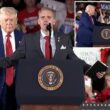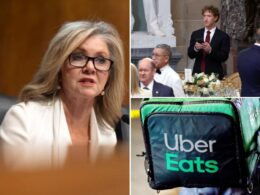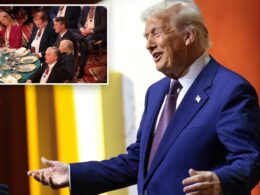WASHINGTON — The Trump administration’s negotiations for tailored trade deals are shrouded in “strategic uncertainty” despite persistent public insistence that agreements are close — prompting former Commerce Secretary Wilbur Ross to say Tuesday he hopes Trump’s team won’t “over-negotiate” and lose momentum.
The White House took optimistic projections to new heights with current Commerce Secretary Howard Lutnick declaring Tuesday mid-afternoon that a deal with an unnamed country was “done, done, done” — 27 days after Trump announced his “reciprocal” levies and more than two months before the July deadline for them to take effect.
Earlier Tuesday, a source close to the administration described the status of negotiations like this: “It’s like when someone tells you they’re five minutes away, everyone knows that really means 15.”
Still another insider insisted that deals were “close” with Asian countries — a point underscored by Treasury Secretary Scott Bessent at a Tuesday morning White House briefing.
However, promising developments including visits by Japanese and South Korean delegations, a presidential call with Vietnam and a vice presidential “roadmap” announcement in India have not yet manifested in a completed trade agreement.
“President Trump creates what I would call strategic uncertainty in the negotiations, so he is more concerned about getting the best possible trade deals,” Bessent told reporters Tuesday.
“What we are doing is we’ve created a process. I think the aperture of uncertainty will be narrowing, and as we start moving forward announcing deals, then there will be certainty. But certainty is not necessarily a good thing in negotiating.”
Ross, who had Lutnick’s job for all four years of Trump’s first term, told The Post he worries that the administration will seek too tough of a bargain.
“My one fear is, because we do have a strong negotiating position, there may be the danger that we will over-negotiate,” Ross told The Post.
“And that would make it hard and delay [a final outcome]. So if we do something at all reasonable, I think they’ll come to terms very, very quickly. And I think once we get the first couple done, then everybody will see the pattern, and will make it easier to get others done.”
Ross noted that current trade negotiations are starkly different from the president’s reworking of the NAFTA pact with Canada and Mexico — which was replaced by the USMCA — and the Phase One deal with China in 2020.
“With good reason, they’re trying to go very fast — that’s why you’re seeing they put out an idea, then a day or two, a week or month later, they modify it as they get more facts into their orbit,” Ross said.
“It’s a little bit of a different process and therefore it makes it a little bit difficult to follow.”
Trump, a lifelong advocate of tariffs to protect domestic manufacturing, has dramatically unfurled a menu of different tariffs during the first 100 days of his second term — in many instances pausing or modifying them in response to evolving developments or to allow more time for either further talks or businesses to open US factories.
On Tuesday, Trump signed an order clarifying that his 25% tariff on imported cars and auto parts will not be levied on top of his strict 25% steel and aluminum duties or his 25% tariffs on non-USMCA compliant Canadian and Mexican imports.
Bessent said Tuesday that Trump’s team is focusing on 18 top economies for deals — as the president demands an end to foreign tariffs and non-tariff barriers, as well as a leveling out of current US trade deficits.
“I think [the current talks] are going pretty well. The complexity, though, is enormous,” Ross said.
“Normally, trade deals go one by one. And they normally take six months, 12 months, two years to get done. What the Trump administration has decided to do is, in effect, negotiate with the whole world more or less simultaneously. That’s a much more complicated task.”
Ross, 87, said he was skeptical that Trump’s team will agree to full trade deals by July 8, when Trump’s 90-day timer for implementation runs out.
“It would be very hard to have a full-blown detailed agreement by then. But what we very well could have would be an agreement on the core outline,” he said. “You know, a trade deal can run 1,000 pages.”
Still, Ross feels that the US enjoys leverage over the rest of the world.
“A dollar of trade pain that we inflict on them is much more damaging than a dollar of trade pain they inflict on us,” he said.
“Take China, for example. China’s economy is only two-thirds [the size] of ours. So that means the dollar of trade pain on them is 150% as important as $1 inflicted on us.
And when you get to the lesser countries, it’s even more, Canada, Mexico, around 10% of our economy. So that means a dollar of trade pain on them is nine or 10 times as powerful as it is on us.”








